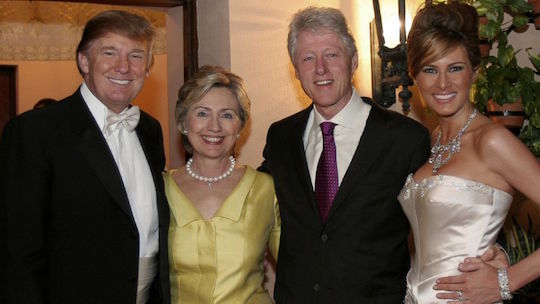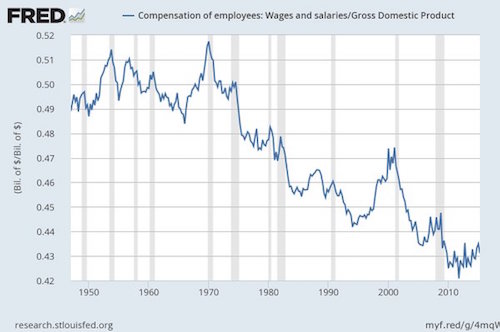Who says Hillary Clinton isn’t the best candidate to address wealth inequality? Racists and bros, mostly—the rest of us know better. Here’s the presumptive Democratic nominee telling the New York Times that she’s open to considering Mark Cuban or another successful businessperson as her vice president:
“Businesspeople, especially successful businesspeople, who are really successful — as opposed to pretend successful — I think, have a lot to offer,” said Mrs. Clinton, whose campaign has begun taunting Mr. Trump with a #PoorDonald hashtag on Twitter, suggesting that he is not nearly as wealthy as he claims. Mr. Trump has cited an audit by the Internal Revenue Service as his reason for keeping his tax returns private.
Clinton supporters on Twitter have begun circulating the claim that Donald Trump is not a multi-billionaire, as he says, and that his net worth is actually less than $100 million. That would put him below the Clintons’ estimated worth of $110 million, nearly all of which they made after Bill became president. Surely, voters will flock to Hillary once they start thinking of her as the richer candidate.
It’s understandable the Clinton campaign would attribute some of Trump’s popularity to his wealth and attack him accordingly. The #PoorDonald hashtag is a jab at his refusal to release his tax returns, and it’s obviously ironic. Even if Trump doesn’t have billions of dollars, he’s still not poor by normal Americans’ standards. But calling him poor—making a derisive talking point out of his paltry $100 million—is hardly a strategy to win over voters who think politics is rigged in favor of the rich.
This seems particularly true of disillusioned Sanders Democrats who worry Clinton doesn’t care enough about inequality. When Clinton says successful businesspeople have a lot to offer her campaign, she is probably thinking about contrasting them with unsuccessful businesspeople like Trump. But she is also saying she wants to bring more rich people into her fold. That is the wrong message to send to Democratic voters now divided over the issue of wealth inequality.
Inequality is not some pet theme of the Sanders bloc, either. It is a real problem that matters to the vast majority of voters across the ideological spectrum. Check out this fun graph:
That’s not from the Daily Kos forums; that’s data compiled by the Federal Reserve. Regardless of whether America is getting great again or never stopped being great, our economy is paying people less. The steadily shrinking fraction of GDP that Americans get for actually working explains how wages have remained stagnant while productivity has skyrocketed, or why the investment economy has recovered from the 2008 crash while pay and employment haven’t. It also explains why questions of class—of moneyed influence on politics, of immigration, of medical insurance and debt, of the decreasing number of intersections between Wall and Main streets—have dominated this campaign.
Within the Democratic party, young people are mad at rich people. Clinton fares poorly against Sanders with Democrats under age 50. But she makes up the difference by doing very well among two other blocs: people of color and people who make over $100,000 a year.1 It’s probably safe to say that running against Trump in the general, Clinton will have the nonwhite vote sewn up. Is she now pivoting to her other natural base of support? This #PoorDonald business might be a sign that, far from being pulled to the left as conventional wisdom holds, her experience with Sanders has led her to court the $100k-plus vote among independents.
That’s what her husband did in 1992, and it worked. But the middle class was bigger then, and people who made $40,000 a year felt more solidarity with high-earning professionals than they do now. Perhaps, in 2016, deriding Trump for not really having a billion dollars is a bad look for the hundred-millionaire wife of a president to adopt.
But what are poor people going to do—vote for Trump? The guy’s a New York real estate mogul. He made his money in the most disgusting way imaginable, whereas the Clintons raked in a hundred million through politics. When you put it that way, #PoorDonald seems to brandish the knife handle-first. I still think Hillary will beat him in November. But if there is a way to lose to Trump, her campaign seems to be hard at work finding it.






Sure, Clinton should not behave in a way that alienates voters because she might lose to Trump. However, that is not the same argument as Clinton is uninterested or incapable of implementing policies which will help increase prosperity for middle class voters. This is a much more interesting argument, because it forces us to say what policies help increase prosperity for middle class voters. That’s a more productive question than how we make people who make $40,000 a year feel more solidarity with high-earning professionals like they used to. One is a research question, the other is a campaign question. I couldn’t care less what people who make $40,000 feel solidarity with, and neither should you. Because we are not campaign managers, we’re voters.